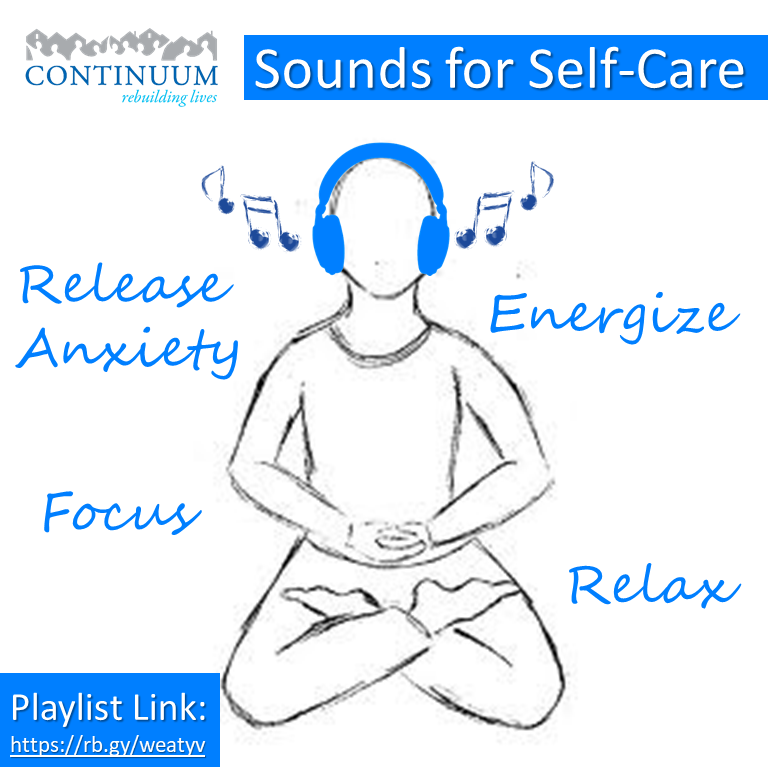August 2020 Newsletter: Staying safe and creating change
Wednesday, August 26, 2020
In This Issue:
Continuum Stands Up to COVID-19
Black Mental Health Matters
Employment Program Changes Lives
Continuum's Call for Change
Eat Well, Stay Safe & Support Lives at Grassroots Deli
Sal Annunziato to Perform: November 6
Take a Break: Sounds for Self-Care
Continuum Stands Up to COVID-19
It’s been 6 months, and we aren’t letting up. We continue to take COVID-19 seriously. We are in the fight together, so staff, clients, and families alike are using best practices to keep ourselves and each other safe. We are social distancing, wearing masks, continuously hand washing and sanitizing, diligently following CDC and State guidelines, and following additional protocols in efforts to conquer and eventually eliminate the threat of COVID-19 from our lives.
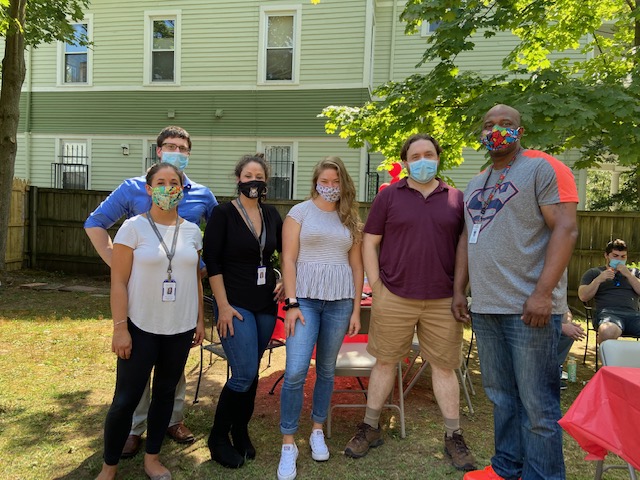
Some of our efforts include:
- Comprehensive COVID-19 screenings in our group homes and at the administrative office
- Enforcement of 14-day quarantine and evidence of negative COVID test results for staff traveling to COVID-19 impacted states or who have come into contact with COVID-19
- Routine updates from the Executive Team on CDC guidelines regarding symptoms and best practices for seeking medical care
- Constant sanitizing performed by our Employment Apprentices, who have also been providing much needed sanitization services to other nonprofits and private companies in Greater New Haven
Continuum is committed to staying safe as we continue to provide life-essential services.
Black Mental Health Matters
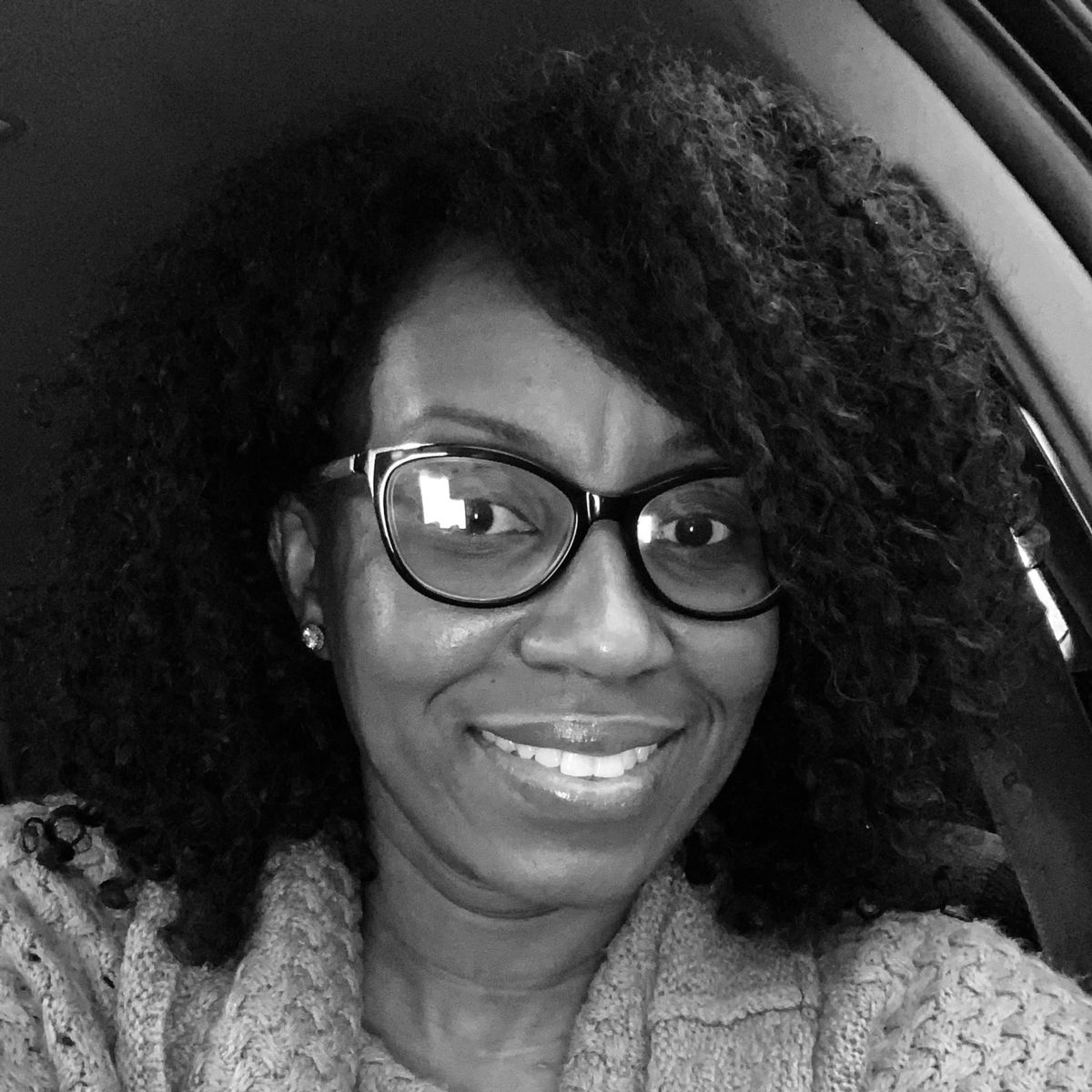 The intersection of recent national and local events have heightened attention on the pervasive needs in the area of mental health, as well as the long history of anguish and oppression of the Black community. Black therapists have a unique lived experience and perspective for their Black clients, and they are often sought after by Black clients for that reason. So, we interviewed Cluny Gombar, a Black Licensed Professional Counselor with years of experience working with children, adults, and families in many different settings.
The intersection of recent national and local events have heightened attention on the pervasive needs in the area of mental health, as well as the long history of anguish and oppression of the Black community. Black therapists have a unique lived experience and perspective for their Black clients, and they are often sought after by Black clients for that reason. So, we interviewed Cluny Gombar, a Black Licensed Professional Counselor with years of experience working with children, adults, and families in many different settings.
Cluny has a wide breadth of experience and practices counseling at Stokes Counseling Services, Achieve Wellness Center, LifeBridge Community Services, and the Wellness Place. In our interview, she sheds some light on the challenges of mental health and therapy for the Black community.
According to the American Psychiatric Association, mental illness is the second largest cause of morbidity for Black Americans. Yet, only one in three Black adults who need mental health care receive it. Why is this the case?
“There are several barriers to mental health care that I’ve seen affect the Black community. I think the number one reason is lack of awareness – especially for people who come from cultures or countries where mental health care is almost nonexistent. In Haiti, I lived in the biggest city in the country and I do not remember seeing one mental health facility.
Another reason is that many Black adults in the United States don’t have health insurance and cannot afford to pay for therapy out of pocket. Society plays a role as well, as there is a stigma around discussing mental health matters. Some see it as a sign of weakness which prevents them from even talking about getting help. Often in the Black community, what happens in the home stays there. We don’t discuss what’s happening in our homes with outsiders.
I think there’s a lack of connection, as well. Black people feel like they won’t be understood by white therapists. There’s a big lack of trust. Rather than seeking a medical diagnosis, they feel, ‘I’d rather seek the help from people who understand me.’ They want to stick with other Black members of the church or whatever institution that plays a role in their life.”
There has been a lot of discussion about regular encounters with racial bias, discrimination, racism, and hate crimes. As a result, most Black people have experienced racial trauma which can affect an individual's ability to cope, causes feelings of helplessness, and diminishes a person’s sense of self. What are the mental and physical tolls of racial trauma?
“Mental health effects can be depression, anxiety, and a sense of hopelessness. Individuals experience emotional distress like feelings of shock, anger, defensiveness, helplessness, and even guilt or shame – and it can also impact their relationships with other people. Racial trauma can negatively impact functioning. For example, some find it harder to accomplish things and get organized. Some people escape by abusing substances, over-eating, and other destructive behaviors to cope with chronic stress symptoms. In addition, mental health issues can be at the heart of long term physical effects of racial trauma, like hypertension and heart disease.
Sadly, we can also pass trauma on to other generations.”
What have you observed with your Black patients amidst the current crises of COVID and heightened racial tension?
“I’m seeing fear, increased depression, and awareness. Racial tension has always been around, but now more than ever people are more eager to educate themselves about it. People are angrier and want change. People are more eager to learn about racial discrimination and systemic racism and how it’s impacting their lives. For example, more people in the Black community are dying from coronavirus due to systemic health and social inequities that put them at increased risk. My clients are taking better care of their health and are more aware of how it impacts other aspects of their life.
I have been affected as well. After the death of George Floyd, I found myself so distracted and disorganized. I had trouble talking. I was unable to concentrate. I had to take time off just to get my mind right. I was like, ‘I can’t function like this. There’s just too much going on in the world.’
And I’m angry too. I’m tired of being tired. So I allowed myself time to reflect and process my feelings. I do a lot of prayer and meditation. I talk to myself a lot to ground myself, to remain aware of my surroundings, and to stay present. If I’m not focused – or if I bring any tension or bias into my sessions – I can’t concentrate on my clients. That would negatively impact the services that I provide to them.”
In terms of managing and healing from racial trauma, do you have any advice on actions one can take, and coping mechanisms?
“I advise people to educate themselves on racial trauma so they can identify it and recognize the symptoms. We deal with racism at school, work, the supermarket – everywhere. So when a racist incident occurs, it is best to be prepared with tools to address it. I encourage people, especially young people, to engage in activism so they can feel empowered to advocate for themselves and others. Engaging in stress management and self-care interventions, as well as interacting with social support networks, is also important. Depending on the person, I may recommend prayer. I advise people to seek treatment.
When seeking treatment for racial trauma, be mindful of choosing a therapist that really takes culture into consideration. Make sure they’re not just focusing on your symptoms; they’re focusing on the root of it.”
How can people go about finding culturally competent care?
“That’s a tough one. Often, a client doesn’t even know what the term means so they don’t know what the therapist needs to know to be culturally competent. Be mindful that the therapist assesses you as a person, rather than just focusing on your symptoms.
If a therapist was to tell me, ‘Make sure you’re getting culturally competent care,’ I would think they mean that the therapist knows I’m from Haiti. I wouldn’t know that person could also be referring to my religious beliefs. Your therapist doesn’t have to have complete knowledge but they must respect who you are in terms of your culture and ensure that it’s taken into consideration for your treatment.
When someone is seeking help, they can go to online platforms like Psychology Today to look for a particular kind of therapy and ensure the therapist matches criteria of culture, language, or any type of connection they seek. I’ve had clients tell me, ‘I went on Psychology Today and it says you are a Christian so I want to connect with you.’
Going directly through an agency doesn’t provide that option. Often, office staff connect them with whoever is available or has room on their caseload, not necessarily a therapist that the client will connect with best.”
A barrier to mental health care in the Black community is a shortage of Black therapists and psychiatrists. How has this lack of representation affected your educational experience and work in your field?
“It’s affected me in many ways. I had literally one Black teacher in grad school. I took one class in in Social and Cultural Diversity, which did not cover much or prepare me to work with clients from so many different backgrounds. After I graduated, I had to educate myself about cultural competence. After I started training in the field, I do not think I had any supervisor that was Black that I could go to with a question about a client experiencing racial trauma. When discussing cases or clients with a supervisor, the cultural aspect of treatment was never something that was highlighted in spite of the fact that every discussion with my Black clients involved questions about culture.
For example, one of my supervisors didn’t think a client would take to treatment because they were saying things like, ‘I don’t want to be here, I was asked by court to come to therapy. I don’t know why I’m here.’ I was still in training but I tried to figure out how to make sure the client stayed in treatment. I was simply told, ‘You can’t help everyone.’ I was not taught to examine the cultural angle or consider the Black community’s perception of therapy.”
How can our behavioral healthcare system better care for marginalized communities?
“The main issues are accessibility barriers and finding culturally appropriate treatment. If culture isn’t taken into consideration, clients will leave. They may seem to be avoiding, but in reality, it’s likely a cultural barrier rather than avoidance.
Clients may be unfamiliar with mental health and how it can impact them or their children. It helps to take the time to fully explain these potential impacts. Address accessibility barriers.
The other day I was talking to a white person who has a high-level job at a community-based behavioral health agency. This person felt uncomfortable to say Black or African American or discuss racial injustice in my company, yet they work at an agency where 95% of the population served is Black.
There are ways to help someone like that move forward. One suggestion is to organize group talks to discuss racism and social injustice. Participate in those conversations to become familiar and more comfortable. Remaining uncomfortable talking about or even hearing the issues makes you part of the problem. When I gave that person that advice, I said, ‘I’m not saying you’re racist but I can see how uncomfortable you are. If you’re uncomfortable talking to a professional like myself, how are you going to address your client who is coming to you angry or upset about racial injustice?’
You have to go outside of your agency to understand the community that you work for. How are you going to understand or help if you don’t talk?”
Do you have advice on how non-Black people can help support the mental health of their Black friends, family, and colleagues – especially during this time?
“Stop talking and start listening without bias. Discussions about racial injustice can be difficult and stressful conversations. Don’t be quick to react. Allow people to vent and talk about their feelings. Educate yourself about the things that are impacting the Black community so that you can speak from a place of deeper understanding.
My family is multicultural and we have a big text groupchat where we discuss these issues and exchange ideas every day. My family does not tip toe around these conversations with my husband who is white. I always tell him, ‘You are an amazing father and husband. You know how to raise your son. But you don’t know how to raise a Black man in America. You can’t have the same conversations my brother has with him because, without that experience, you don’t understand.’ So I encourage him to continue to educate himself.
In my household, talking about race is important because, after all, it affects our everyday lives and we are raising bicultural children. We allow one another to express ourselves.”
Can you leave us with a message of hope?
“We’re all in this together and we can all make a difference if we try. We can all educate ourselves. Don’t make excuses to justify lack of awareness.
We have the tools to make a difference. Let’s use them.”
Check out our (Cluny-approved) list of mental health resources for the Black community: Anti-Racism Resources & Support
Employment Program Changes Lives

Employment changes lives, and especially for those who are challenged with a variety of barriers to finding a job. Thanks to Continuum’s Employment Apprenticeship Program, individuals who otherwise might not be able to work are learning new skills and becoming gainfully employed.
Omar is an inspiring example. When he immigrated from Jamaica to America to further his university studies in computer science, he was doing well for himself as he worked his way through school. Then, he developed depression and paranoid schizophrenia, and his life fell apart. Mental health treatment and medication helped stabilize Omar, but it was critical to him that he’d be able to support himself.
The Employment Apprenticeship Program changed his life, he says.
Omar started the program as a porter cleaning Continuum’s administrative office. His diligence on the custodial crew, kind spirit, and beautiful singing voice made him an office favorite. He grew socially through working with people who have supported and lifted him up. Omar’s greatest reward has been his renewed ability to handle life’s responsibilities, such as buying a car, and his restored goal of finishing school and pursuing his career in computer science.
Now, Omar as he has moved out of Continuum’s Offices and on to Phase II of the program. He’s currently portering at the West Haven Mental Health Center where there is less supervision and more responsibility. We know he’s representing Continuum well. We look forward to watching Omar’s continued growth.
As we say goodbye to our Phase I apprentices like Omar, we welcome and embrace new trainees to 109 Legion. It’s always exciting to witness lives being newly rebuilt.
Click here to read more about the program.
Continuum's Call for Change
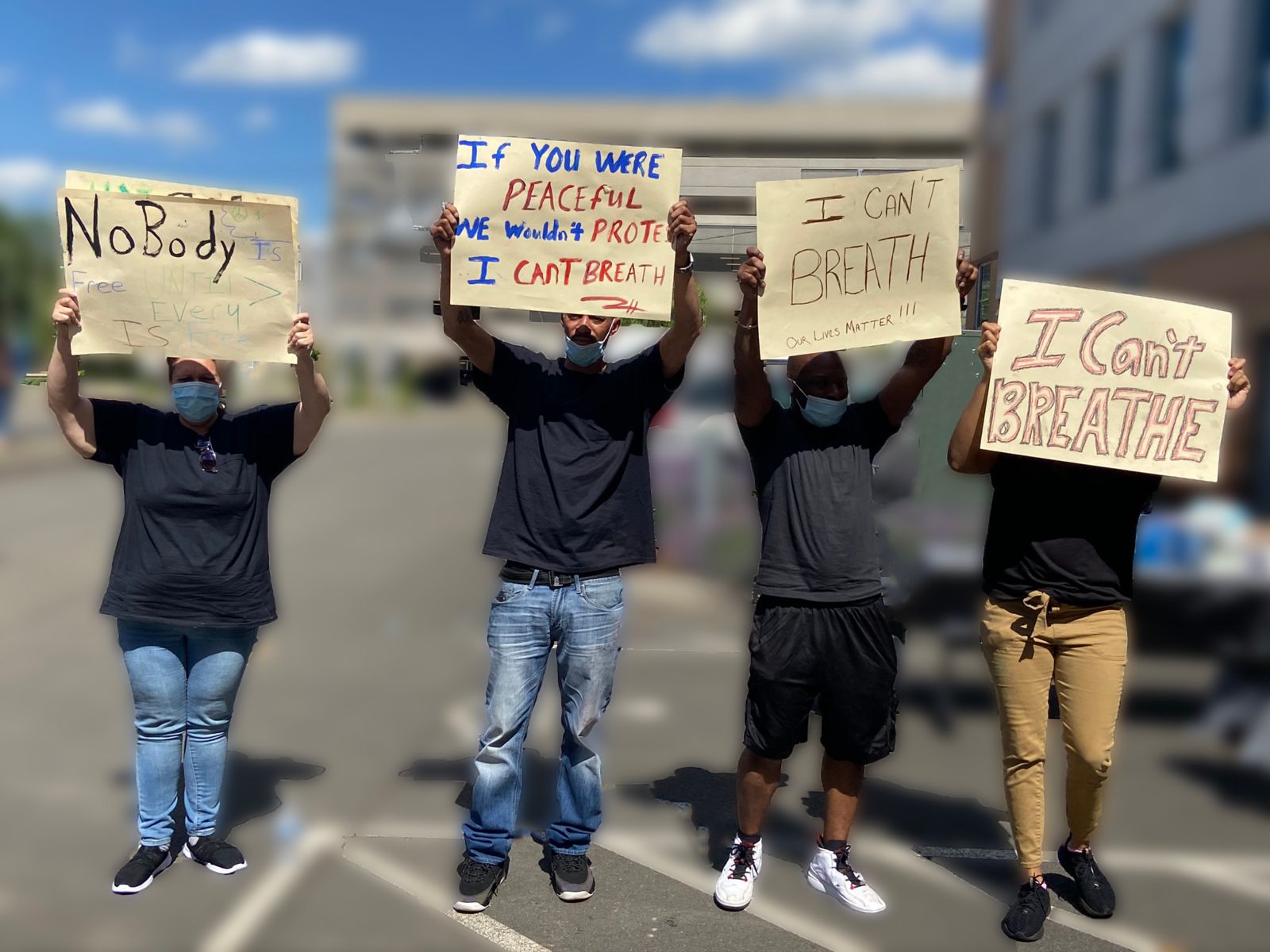 “The week after George Floyd was murdered, we had community meetings at both of my Crisis programs so staff and clients could express their feelings. A lot of people seemed to feel numb to the situation because it's been going on for so long,” shared Jen Vargas, director of Continuum’s Acute Services programs.
“The week after George Floyd was murdered, we had community meetings at both of my Crisis programs so staff and clients could express their feelings. A lot of people seemed to feel numb to the situation because it's been going on for so long,” shared Jen Vargas, director of Continuum’s Acute Services programs.
“I was really taken aback because many of them have had negative experiences with police because of mental illness and addiction. It’s almost like they’re desensitized.”
As shocking and appalling as the back-to-back murders were of George Floyd, Breonna Taylor, Ahmaud Arbery, the loss of Black lives due to ongoing systemic racism is far too common. And Continuum’s staff and our already vulnerable clients – many of whom are Black – with mental illness and intellectual disabilities are threatened daily by a world that discriminates against them.
This summer, the entire world confronted racism and protested for social justice, including right here in New Haven. Continuum staff and clients were inspired to get involved. John Labieniec, VP of Acute and Forensic Services, shared, “I asked, what can we do to create the openness and the safety to be honest about things and not feel bad? A space to say, ‘I'm sorry, I was wrong, thank you for teaching me that.’ We need to listen and learn.”
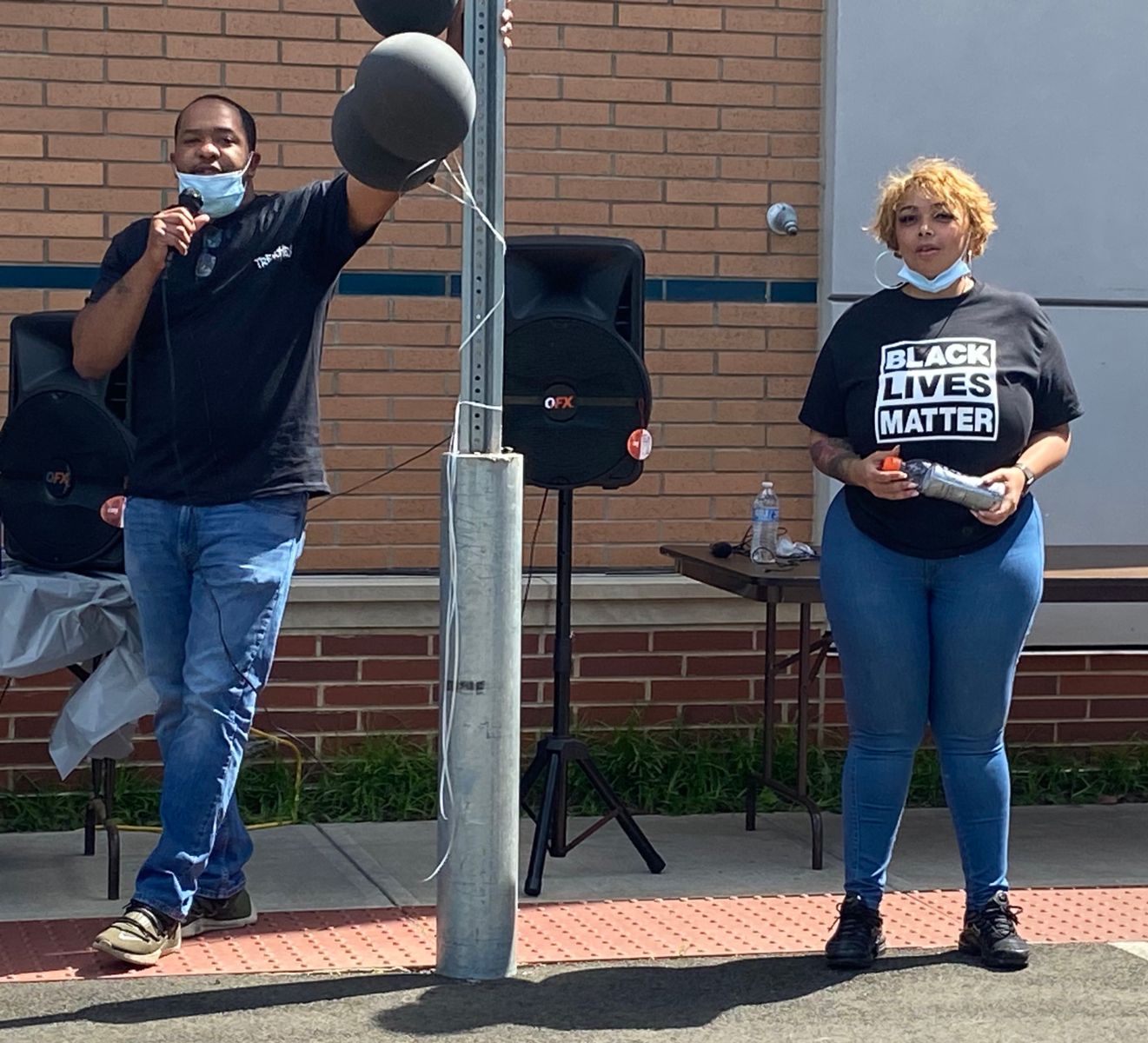 The team from our Crisis programs put together an on-site Black Lives Matter demonstration to open up conversation across the Agency and provide support in a comfortable, safe space.
The team from our Crisis programs put together an on-site Black Lives Matter demonstration to open up conversation across the Agency and provide support in a comfortable, safe space.
It was incredibly heartening to see the diverse crowd that came together in solidarity at the demonstration in June. A mix of staff, community leaders, and clients revealed their personal stories and shared their visions for a non-discriminatory, anti-racist world. The passion from the speakers and the encouragement from attendees were infectious.
“A week after George Floyd’s murder, a kid asked me, ‘Can I have a mental health day from being Black?’ and I didn’t know what to tell him,” shared Aquil Crooks, Continuum staff and community advocate. Aquil spoke on his experience of being a Black man fearful for his life in the world. In spite of his sobering words, he uplifted the crowd with poetry celebrating Black pride and calling for hope.
Rebecca Eaton of our Crisis New Haven program asked a simple question: “What are you willing to sacrifice in order to destroy systemic racism?” Her remarks highlighted the long history and continued presence of racism in the United States. She shared her parents’ story of working as sharecroppers and living through the racial violence of the Deep South, as well as her present-day experiences with discrimination as a Black woman.
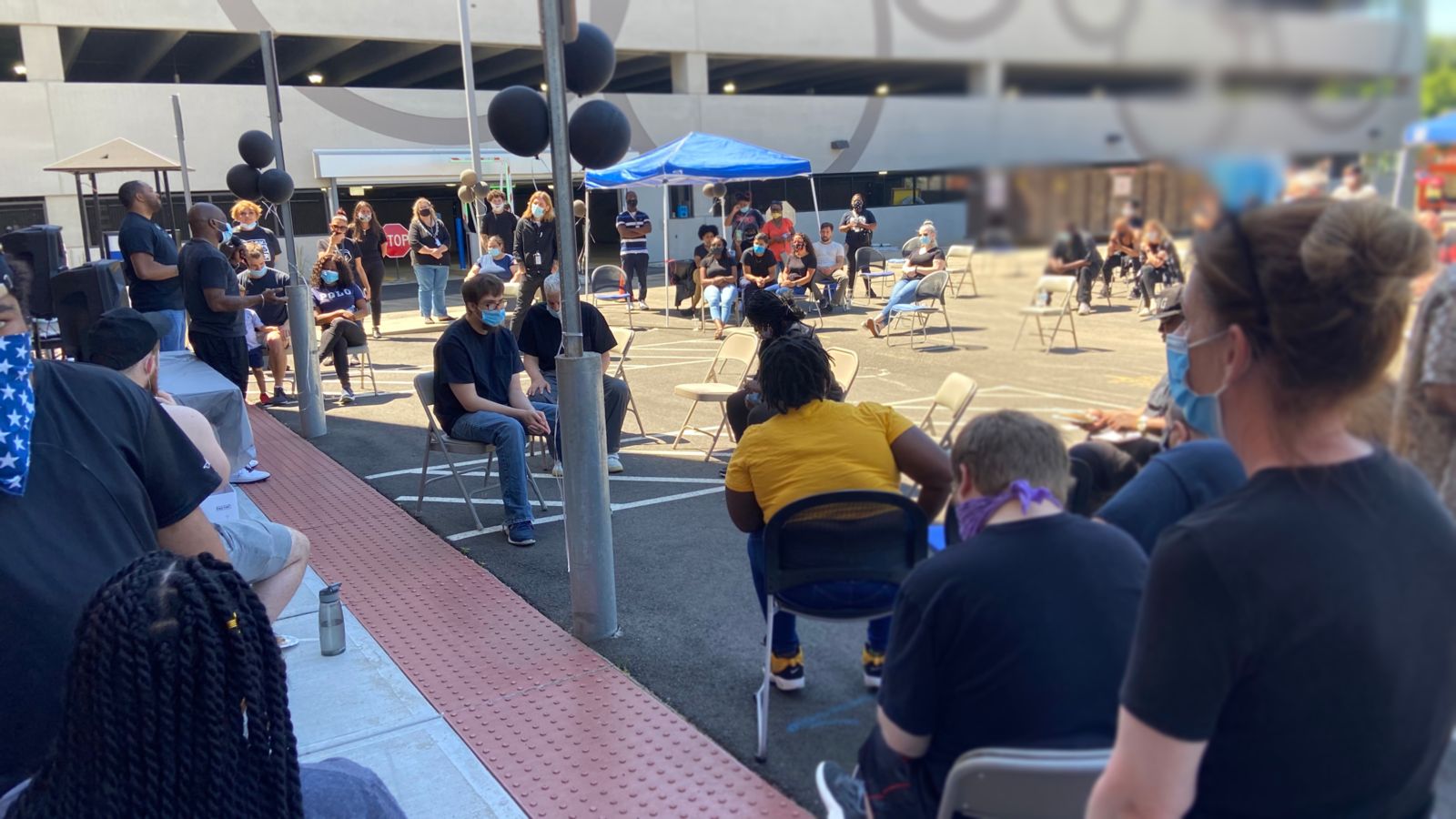 Other speakers expressed their desire to learn more about anti-racism and contribute to the fight for social justice. Everyone was moved by people’s willingness to get up and say what’s on their hearts. And those who didn’t pick up the mic spread their messages of positivity and action with their signs.
Other speakers expressed their desire to learn more about anti-racism and contribute to the fight for social justice. Everyone was moved by people’s willingness to get up and say what’s on their hearts. And those who didn’t pick up the mic spread their messages of positivity and action with their signs.
Shamare Holmes, director of community organization HerTime, galvanized the crowd, telling us that there is no time to be complacent. “It’s okay to be angry. It’s okay to be in a place where you can’t formulate the words, but channel how you feel into something productive.” She reminded us that we all have unique gifts to contribute to the movement.
Continuum’s President and CEO Patti L. Walker concluded the event with a call to action, inviting staff to join the newly established Racial Equity Team. The task force will help with plans to make permanent, equitable change across the Agency.
“We all need to be in this together,” said Patti. “We all have to be part of the solution.”
Watch the video of Continuum's Black Lives Matter Demonstration below
Eat Well, Stay Safe & Support Lives at Grassroots Deli
Sal Annunziato to Perform: November 6
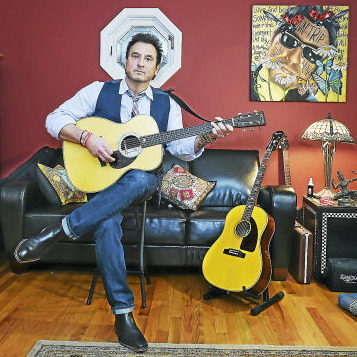 Save the Date for Continuum's virtual concert with singer/songwriter/musician Sal Annunziato. We can guarantee that Sal's musical mix of rock n' roll, oldies, and original music will make for a lively good time!
Save the Date for Continuum's virtual concert with singer/songwriter/musician Sal Annunziato. We can guarantee that Sal's musical mix of rock n' roll, oldies, and original music will make for a lively good time! Take a Break: Sounds for Self-Care
We're all experiencing anxiety throughout this seemingly never-ending COVID process. Now that more places are opening up, like schools, the anxiety is only increasing.
You deserve a break. So, throw on your headphones and listen to our Sounds of Self Care Playlist to release anxiety, find focus, and boost positive energy.
View Article List

